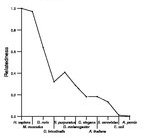
| Name: PUM2 | Sequence: fasta or formatted (1064aa) | NCBI GI: 13491168 | |
|
Description: pumilio homolog 2
|
Referenced in: Stem Cells and Early Development
| ||
|
Composition:

Amino acid Percentage Count Longest homopolymer A alanine 9.8 104 7 C cysteine 0.9 10 2 D aspartate 4.1 44 4 E glutamate 4.3 46 2 F phenylalanine 3.6 38 2 G glycine 9.1 97 2 H histidine 2.4 26 2 I isoleucine 3.7 39 2 K lysine 3.6 38 2 L leucine 8.8 94 2 M methionine 2.1 22 2 N asparagine 4.1 44 2 P proline 7.0 75 3 Q glutamine 8.6 91 6 R arginine 4.4 47 2 S serine 10.6 113 4 T threonine 4.7 50 2 V valine 4.8 51 2 W tryptophan 0.4 4 1 Y tyrosine 2.9 31 2 |
Comparative genomics:
Search single species RefSeq proteins at NCBI
Search summary 
Figure data | ||
Related human proteins:Protein Relative score Description Self-match 1.000 pumilio homolog 2 PUM1 0.755 pumilio 1 isoform 2 PUM1 0.753 pumilio 1 isoform 1 KIAA0020 0.021 KIAA0020 protein SRRM2 0.019 splicing coactivator subunit SRm300 SNAP91 0.016 synaptosomal-associated protein, 91kDa homolog HRNR 0.014 hornerin C13orf23 0.013 hypothetical protein LOC80209 isoform 2 C13orf23 0.013 hypothetical protein LOC80209 isoform 1 NUP214 0.013 nucleoporin 214kDa RBM14 0.012 RNA binding motif protein 14 ARID1B 0.012 AT rich interactive domain 1B (SWI1-like) isoform 1 ... SRCAP 0.012 Snf2-related CBP activator protein ELN 0.012 elastin isoform e precursor ELN 0.012 elastin isoform d precursor ELN 0.012 elastin isoform c precursor ELN 0.012 elastin isoform b precursor ELN 0.012 elastin isoform a precursor PER1 0.012 period 1 ARID1B 0.012 AT rich interactive domain 1B (SWI1-like) isoform 3 ... POM121 0.012 nuclear pore membrane protein 121 ARID1B 0.011 AT rich interactive domain 1B (SWI1-like) isoform 2 ... LOC100288540 0.011 PREDICTED: hypothetical protein XP_002342775 ZMIZ1 0.011 retinoic acid induced 17 POM121C 0.011 POM121 membrane glycoprotein (rat)-like SPTY2D1 0.011 SPT2, Suppressor of Ty, domain containing 1 GATA4 0.010 GATA binding protein 4 MED1 0.010 mediator complex subunit 1 TRO 0.010 trophinin isoform 5 PHC2 0.010 polyhomeotic-like 2 isoform aHuman BLASTP results (used to prepare the table) | |||
Gene descriptions are from NCBI RefSeq. Search results were obtained with NCBI BLAST and RefSeq entries. When identical proteins are present, the self-match may not be listed first in BLASTP output. In such cases, the table above has been reordered to place it first.
See About the Figures for the scoring system used in the figure above right. The same scoring system was used in the table of BLASTP results.
Guide to the Human Genome
Copyright © 2010 by Stewart Scherer. All rights reserved.
